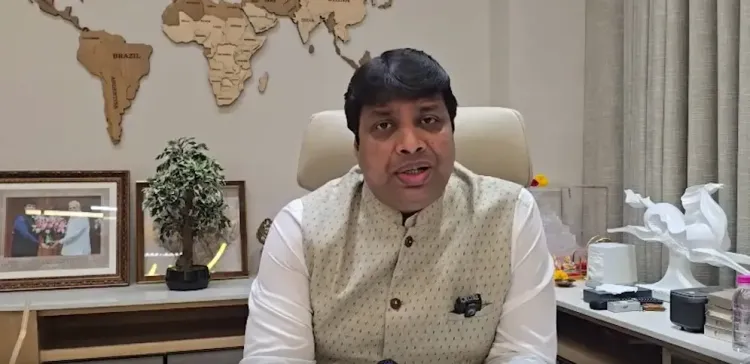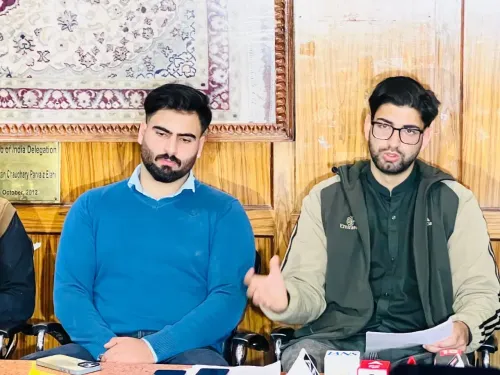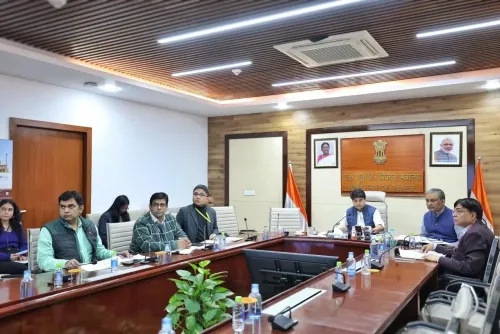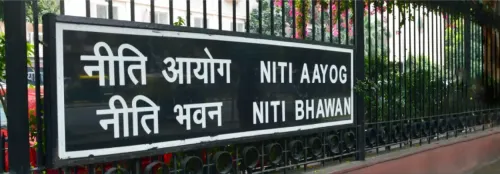Is Rahul Gandhi's Criticism of Constitutional Institutions a Threat to Democracy?

Synopsis
Key Takeaways
- Rahul Gandhi raised objections to the ECI's SIR process.
- BJP's Rohan Gupta warned against targeting constitutional institutions.
- A group of 272 eminent citizens condemned the Congress for undermining democracy.
- Criticism of the ECI reflects a concerning trend in Indian politics.
- Political leaders should focus on solutions instead of blame.
Ahmedabad, Nov 19 (NationPress) As the Leader of Opposition in the Lok Sabha, Rahul Gandhi has expressed his concerns regarding the Election Commission of India's (ECI) Special Intensive Revision (SIR) process. In response, BJP leader Rohan Gupta criticized Gandhi on Wednesday, labeling his actions as negative political maneuvers targeting the nation’s constitutional institutions, a practice he termed as hazardous.
On Tuesday, Gandhi articulated strong objections to the SIR process concerning electoral rolls, stating that the Congress would contest it on political, organizational, and legal grounds to protect the integrity of democracy.
In a statement to IANS, Rohan Gupta remarked, “In recent days, Rahul Gandhi has engaged in negative politics aimed at undermining constitutional institutions, which poses a significant risk. Elections in our country have been conducted for decades; sometimes a party secures victory, while other times it does not. Traditionally, the losing party reflects on their performance. However, for the first time, the blame for potential defeat is being directed towards the ECI even before the results are in.”
He further added, “This is the same Rahul Gandhi who held a press conference in Bengaluru, accusing others of electoral malpractice. The SIR was executed successfully in Bihar, yet now they are claiming that 65 lakh voters were affiliated with the Mahagathbandhan. Those voters are not theirs, and they owe an apology. Criticizing the ECI reveals a limited perspective. This situation has never occurred in India’s history. Winning and losing are inherent to elections. What they are doing is detrimental. The citizens of Bihar have turned their backs on them, and soon, the entire nation will do the same. Instead of blaming institutions, they should engage in self-reflection and seek solutions.”
Meanwhile, a collective of 272 distinguished citizens, comprising former judges, ambassadors, retired bureaucrats, and Armed Forces veterans, has condemned the Congress and Rahul Gandhi for what they characterize as ongoing efforts to undermine constitutional institutions, including the Election Commission of India.
In an open letter released on Wednesday, this group expressed “grave concern” over multiple instances where Congress leaders have belittled and demeaned essential democratic institutions, such as the Armed Forces, Judiciary, Parliament, and now the ECI. They indicated that the Leader of the Opposition and his associates resorted to rhetoric to defame the Election Commission instead of pursuing legal avenues in cases of perceived irregularities.
“The LoP has continuously attacked the Election Commission, asserting that he possesses indisputable evidence of vote theft and claims to have 100 percent proof of misconduct,” the letter stated.
“Employing vulgar rhetoric, he has described his findings as an ‘atom bomb’ that will leave the EC with no escape when it detonates. He has also threatened that he will not spare anyone within the Commission, from top to bottom. According to him, the ECI is engaging in treasonous acts.”
The letter, signed by Justice S.N. Dhingra, a former Delhi High Court judge, and Nirmal Kaur, a former Jharkhand DGP (IPS), includes signatures from around 272 prominent individuals, including former Supreme Court and High Court judges, ex-envoys, retired civil servants, and Armed Forces veterans.
In reflecting on the behavior of political entities, particularly Congress, regarding complaints after electoral defeats, the letter stated, “When political leaders disconnect from the aspirations of ordinary citizens, they attack institutions instead of restoring their credibility. Theatrics take precedence over analysis, and public spectacle replaces public service.”









